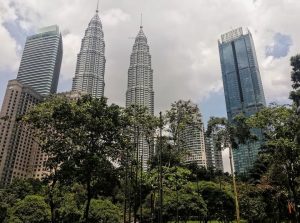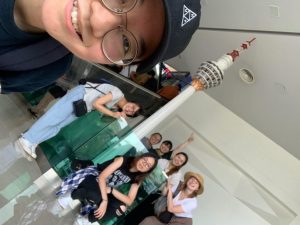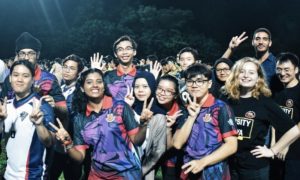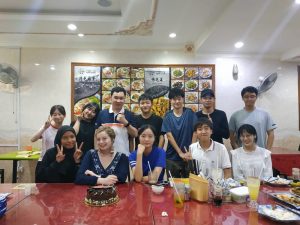When I first drove into Kuala Lumpur I saw a billboard that said: Welcome to Kuala Lumpur – A City of Contrasts, and after 5 months in this Malaysian city – I could not agree more. Kuala Lumpur is a city of contrasts: jungle bursts through the concrete, tall trees bend in the wind next to the sky train, the heat of the day and the freezing cold of the aircon and an amalgamation of cultures and languages that together make up Malaysia. Kuala Lumpur was also a city of contrasts on a more personal level, when I first arrived, it seemed that almost every part of my life would be different in contrast to my life in South Africa, which is an overwhelming feeling. However, as time passed, I began to feel at home in the company of my new friends, in my University and in Malaysia. Looking back at the five months now, I am so grateful for all that I have learned, for all the growth I underwent, for the memories and friendships I have made and, most importantly, how to find balance and a common humanity in, what at first appears to be, unassailable contrasts.

The Patronas Towers
Pre-Departure
It is very important to learn about Malaysia before departure, and I was very luck to have a father that has travelled to Malaysia who could give me good advice about what to expect. My dad gave me a travel bucket list with locations across Malaysia and a travel guide. It is very useful to familiarize yourself with the geography of Malaysia before you depart and keep places in mind that you want to see before you leave.
Visa Application
It is very, very important that you double-check the Visa requirements well in advance before departure. I had to endure great difficulties trying to enter Malaysia because I did not have a single-entry Visa. While South Africa was exempt from needing a single-entry Visa in the past, there has been a change in the immigration procedure, and it is now required. I did, however, see that there was some misunderstanding between Education Malaysia Global Services (EMGS) and the immigration department, so rather just contact Univeristi Malaya (UM) through Stellenbosch International to make sure about your Visa Requirements. For your Student Visa there will be a very easy application procedure to follow and when you apply for university, the UM International Student Centre (ISC) will give you a step-by-step guide. You can track your application online to make sure your Student Visa is approved on time. This application is completed entirely online.
The registration process for Universiti Malaya itself is made very easy by the institution, and Stellenbosch will give you access to registration. You will be required to pay some fees for both your Visa and Registration, so make sure your bursary is in place when you start registration. Choose your modules carefully and make sure the courses you choose are taught in English. While you can change your courses once you are in Malaysia, it is much easier to choose your courses online and in advance to ensure you get a spot in the classroom.
Climate and Dress Code
Perhaps the first thing you will find out when researching Malaysia is that it is a subtropical country that is incredibly hot and humid. Also be prepared for the Monsoon season (October to early December) – the thunderstorms are magnificent, but the non-stop rain can make it difficult to walk to class and go travelling. I made sure that I kept the climate in mind when I packed my bag – keeping my clothing cool and light and leaving heavy jackets and jerseys at home. You will also have to walk quite far to get to class, even if you live on campus, so pack comfortable shoes and clothing.
I also had to consider that Malaysia is a predominantly Muslim country and the dress code of Universiti Malaya (UM) includes strict requirements about hairstyles, clothing and shoes that can be worn on campus. Please ensure you follow the rules and dress accordingly – you can be fined by the university for contraventions, but it is also a sign of respect toward the Malaysian culture to cover up. Carrying a light scarf around with you can also help for an emergency cover-up if you feel that the context calls for it.
Important Tips
• Malaysia uses different wall plugs than we use here in South Africa so make sure your laptop charger is equipped with a universal adaptor or that it charges with a two-point plug (Two-point plugs work fine in Malaysia).
• There is no need to overpack – Kuala Lumpur has an overwhelming number of shopping malls that are fully equipped with almost everything you will need. You will easily find bedding, stationery, cutlery and so on – the only downside is that you will likely leave these items behind when you leave Malaysia. Just ensure that you pack any chronic medication you need or that you have a prescription – I found the pharmacies in Malaysia to be strict about what they dispense. The closest shopping mall to campus is KL Gateway, but a good place to do your big shopping is Midvalley MegaMall or 1Utama.
• UM offers an airport shuttle to take you from the KL International Airport to campus, and I would recommend booking your flights so that you will be able to make the airport pick-up times. Information on these shuttles will be sent to you by the UM International Student Centre about two weeks before you land. If you land in a time slot where there is no shuttle, you can download the Grab app (Uber in Malaysia) or MyCar to order a car to take you to campus. Once on campus, there will be many UM Buddies and staff to welcome you and help you get settled.
Academic program at University Malaya
I spent five months (one semester) as an exchange student at the University of Malaya. During my time as an exchange student I had five courses:
– Entrepreneurship
– Political Science and Public Administration
– International Politics and Human Rights
– Sustainable Development
– Global Environmental Change
I grabbed the opportunity to take modules that I wouldn’t be able to take in Stellenbosch, and registered for modules with subject matter that I was interested in and passionate about. I was so lucky to have taken modules such as Sustainable Development and Global Environmental Change – I didn’t just learn more, but my worldview changed too. Hearing the perspective on issues such as the global economy and climate change from people across the world was an enriching and eye-opening experience – I learned that perspectives differ and that tackling global issues will require mutual understandings and consensus. This, for me, was the most important lesson I learned during my exchange – learning from others, from all corners of the world, is the best way to develop an open and critical mind, to question implicit assumptions that constitute your reality, to be aware of the possibilities to think and do things differently.
Class Work
Sitting in class with like-minded and passionate people was a major advantage of the academic program at UM. The lecturers I had during my stay were experienced, industry professionals who went beyond the textbook. In Stellenbosch, a lot of focus is placed on staying on schedule to cover all the work, but in UM lecturers focus more on real-life circumstances, and how students feel about the subject matter. Most of my classes were debates and discussions, with only brief mentions of the textbooks or theory. Therefore, it was incredibly important for me to work in my own time to make sure I cover the course outline in preparation for exams, because lecturers don’t really go into detail.
However, I was constantly working – we were given many class and online assignments and groupwork presentations. There are many continuous assessment opportunities (especially weekly group presentations) throughout the semester and more emphasis is placed on group/shared learning than in Stellenbosch. Adapting to UM’s more flexible and open-ended academic structure can be challenging for Stellenbosch students who are accustomed to structure and discipline, but speaking to local students and being on class groupchats will make sure you are on the same page as the rest of the students.

At the SUKMUM Athletics closing ceremony
Examinations
I found the exams at UM to be quite challenging -most exams will be worth only 50 or 60 marks and, depending on your module choices, will be in essay format. My recommendation for the exams is to understand the class work, but also to do additional reading, to stay on top of current events and to formulate an opinion about the subject matter. I found the exam questions to be very open-ended, testing how you understand and apply the work- not how you remember it. The UM academic program demanded a different approach from me, and the skills that I have learnt abroad (trusting my academic voice, thinking critically and asking more questions) will make me a stronger student here in Stellenbosch.
Campus Activities
The UM International Student Centre and the UM Buddies will host many events for international students during your exchange semester. I attended many cultural evenings, with South East Asian music, dance and art on display, and I attended traditional holiday celebrations such as the Chinese Mid-Autumn Festival and Malaysia Day. The UM International Students Association (UMISA) will host events that introduce international exchange students to full-time international students, and UMISA hosts many events that I attended – the Halloween party, the Christmas party and the International Food Festival. I found that attending campus activities was the best way to meet new people, to make friends and to experience the unique campus culture of UM. There are also beautiful jogging routes on campus, the 25m swimming pool that is free for students, the UM lake that you can go rowing on and, my favourite part, the University’s botanical garden. All facilities are open and free for UM students.

My Buddy Group Dinner
Travelling
Kuala Lumpur is a massive city with countless attractions and an incredibly far-reaching and efficient public transport system. What this means is that every opportunity to go exploring must be seized. Taking the skytrain (!!), subway and city busses is effortless and cheap and you can easily visit some must-see attractions – KLCC Suria mall and Park, the Patronas towers, the Batu Caves, the National Museum and Mosque and the Malaysian Art Gallery. Kuala Lumpur also has many beautiful parks and jungles that you can explore – the KL Botanical Gardens, the Bird Park and the Forest Eco Park (an ancient rainforest in the city). There are also countless mamaks (outdoor restaurants) that serve delicious foods – I would recommend Teh Tarik and Roti Telur as your first Malaysian meal.

Travelling outside city borders is just as effortless, there are many buses that take you almost everywhere (at a very low cost) – Singapore, Penang, Langkawi, Cameron Highlands – beautiful destinations that are all worth the visit.
Return to Stellenbosch
My journey in Malaysia was one of ups and downs, but the good days in Kuala Lumpur far outweighed the bad. I was glad to return to my family and loved ones, the clear skies and the African sun, but at the same time, I was sad to leave my friends behind. I knew that we would be scattered across the world when we said goodbye and departing with the memories I had made close to my heart was both humbling and melancholic. En route to the airport it was strange to see roads that were once so foreign to me become familiar and I realized, as my flight took off, how Kuala Lumpur became a second home to me without me realizing it. The journey home was a long one – the Dubai Airport was flooded due to an unexpected tropical storm and I was delayed by almost 5 hours. I forgot all about the plane journey (24 hours long) the moment I saw my family at the gates.
Coming home to South Africa and returning to my own life was habitual, it required no effort – it was like climbing into your own comfy bed after being away from home for a while. My lifestyle in Malaysia was so drastically different to my life in South Africa that my time abroad felt almost like a dream for my first few days back home. Trying to compare the two worlds would be fruitless. What matters instead is how I changed during my time abroad. Learning to adapt to foreign contexts and a vastly different lifestyle has made me more resilient and self-confident. Connecting with people from different cultures has made me a better communicator and the conversations I had opened my eyes to worlds very different to my own. My Malaysian friends taught me the value of compassion, my Chinese friends the value of selflessness and my Japanese friends the value of listening to others and respect. The value that these connections brought to my personhood is immeasurable.
Studying at a South East Asian institution has also changed my perspective on certain aspects of South African life. Listening to scholars who are sceptic of the facets of life that I take for granted, such as democracy and universal human rights, made me realize that there are countries premised on vastly different philosophies and conceptions of politics and economics. Negotiating and working in the global society (which is what I intend to do in future) requires an increased sensitivity to these differences and an inter-cultural understanding requires deeper connections than what can be taught in one’s comfort zone. From this perspective, I realized how important it is to, not only go abroad, but to have enough time to immerse yourself in a different culture. I am so grateful to have had this opportunity for immense learning and self-growth.

